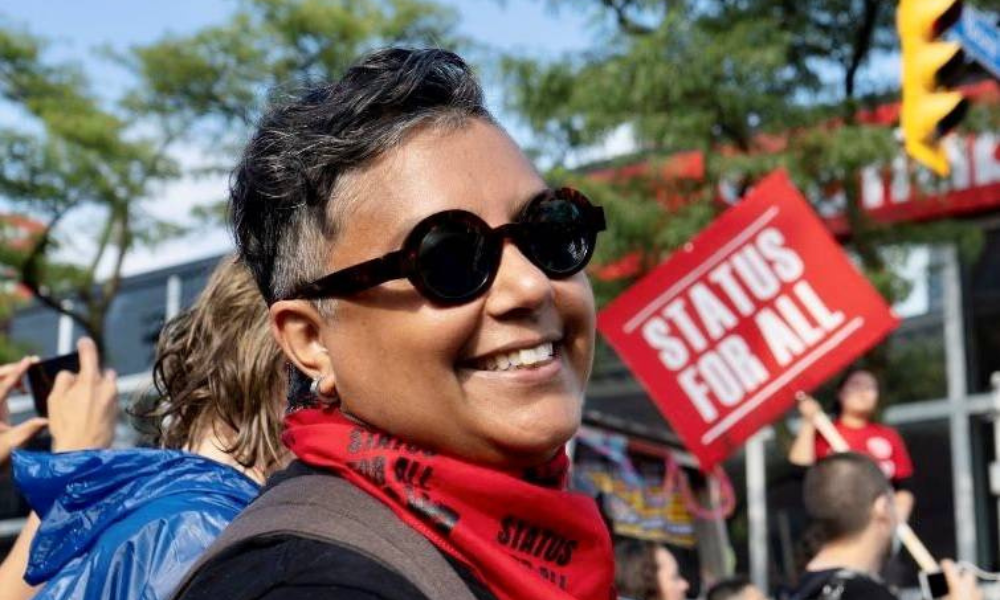Current backlog of 9,000 cases

The Ontario government has been busy lately introducing legislation ostensibly to protect worker’s rights.
In a bid perhaps to deflect the bad news emanating from the Greenbelt controversy, labour minister David Piccini has tabled legislation around pay transparency and outlawing NDAs in sexual harassment cases, to name a few.
But the government’s moves amount to merely tinkering and do not address some real issues that are affecting many employees, says a worker’s rights activist.
“It was incredibly baffling because when we looked at all the different announcements that the minister made, there really is nothing of substance,” says Deena Ladd, executive director of the Workers Action Centre (WAC) in Toronto.
While the government promised to force employers to publicly post salary ranges in job ads, this new law will have less teeth than the previous Liberal government’s attempt in 2018, that was passed but not given royal assent.
The bill was “a robust piece of legislation because what it does is it says that employers with over 100 workers need to produce a report that will actually show what the composition of the workforce is and what compensation people are getting and unless that information starts to become more transparent, we’re not able to see the types of discrimination that is happening. It also stops employers from telling workers that they cannot ask about what people get paid and what their compensation rates are,” says Ladd.
Dismissal after asking questions
A recent case illustrates the absurdity of this provision, says Ladd where a server in a restaurant was fired after inquiring about other colleagues pay cheques.
“She was trying to find out from the other workers, how they were getting paid because people all had different notions of who was getting paid what, what rate they were getting paid, what tip outs were getting paid out. Nobody knew and she was fired for asking that,” she says.
While the government has insisted the new laws will provide greater protection for workers, the current process of a complaints-based human rights commissions is not working.
“The Ontario Human Rights Tribunal system has is presently broken. There are 9,000 cases that are backlogged and there are just a handful of adjudicators and most of those adjudicators that were working for the Human Rights Tribunal, they have not had their contracts renewed. They are hiring inexperienced staff and so if the ministry of labour was concerned about discrimination or pay transparency or about racism in the workplace, or the all the ways in which people can be discriminated against when they’re looking for work, we believe the biggest remedy is to invest in the Human Rights Tribunal process to get rid of the backlog, and to make sure that there are experienced adjudicators that can actually do the work of hearing people’s cases of discrimination,” says Ladd.
Because of this backlog, workers who have concerns about equal pay are not able to get justice, according to Ladd.
“For instance, what if workers do find that there are differential pay rates and discriminatory pay rates, the mechanism to complain about that is through the Ontario Human Rights Commission and that system is broken because of the backlog and there’s not enough to adjudicate it.”
The quick solution is to hire 100 to 200 adjudicators and get them working, says Ladd.
The government also recently announced it will ban unpaid shifts for new workers to train them but the Employment Standards Act (ESA) already forbids this, she says.
“We’re able to use employment standards because that would be wage theft and that would be unpaid work and the [ESA] clearly says that you’re not allowed to have unpaid training so it’s a bit baffling in terms of what exactly that announcement is.”
In order to find out more about what the impact of employers behaving badly, the organization plans to ask Ontario workers via a survey about how they have been treated.
“We’re recovering thousands and thousands of dollars of unpaid wages but what are some of the bigger impacts of when you have a labour market where people are not getting their rights? What does that mean in terms of the contribution to rising levels of poverty, and especially at this moment with the affordability crisis, someone not getting public holiday pay means two weeks of salary: that could be buying a lot of groceries; that is half a month’s rent,” says Ladd.
Appointment with labour minister
For her part, the WAC will contact Piccini soon.
“The minister said that he was open to working with labour advocates and so we are going to be asking him for a meeting to share these concerns with him in person if he agrees to meet,” says Ladd.




